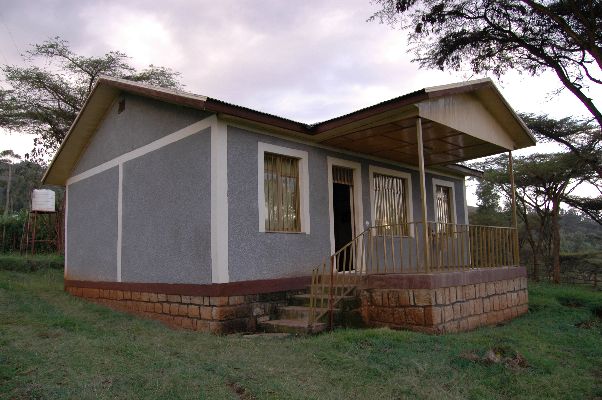When I was in Ethiopia I saw firsthand how missionaries long ago did things right. In my studies of missions, Africa is often given as an example of how to do missions poorly (never mind that because of missions Africa is more than 50% Christian!). The main issue in mission circles is how the use of “mission stations” led to a “us-them” mentality and lots of money were spent on institutions rather than people. I had never been to Africa, so I didn’t know any better.
Well, I went to Africa and in Ethiopia I actually stayed at one of those missions stations! Let me give you a brief history of missions involvement in Ethiopia. Protestant missionaries went centuries ago to Ethiopia, but it was not until the 1920’s that they tried to establish a larger and permanent presence there. The missionaries bought large tracts of land (100-1000 acres) to use as mission stations. On these stations they would produce crops to fund their activities, build Bible schools, primary schools and medical clinics to meet the needs of the local people and provide a base to share the gospel from and raise their own families.
One such mission station was in Durame, Ethiopia where I recently taught. Back in the 1920’s Durame had no believers at all. Throughout the country a few Ethiopians started coming to Christ through the work based from the mission stations. Suddenly the government decided they didn’t want these foreign missionaries around, so they kicked them out of the country. The local believers kept running the missionary stations in their absence. When the missionaries left, they had only a few Christian converts throughout the country. When they came back to Ethiopia more than a decade later, the missionary stations were still running but there were not a handful of believers, but rather tens of thousands of believers.
The missionaries went right back to work on the mission stations. More and more missionaries came. Some were doctors, some educators, some Bible translators, some farmers, some evangelists. . . but they all worked from the stations to provide for their ministries and outreach among the people. The numbers of Christians grew to the hundreds of thousands across Ethiopia. In the 1970’s the communists took over Ethiopia and killed their emperor. Missionaries were forced to leave again.
The mission stations continued, now manned with thousands of believers, but no western money flowing in. Because they had the land, they farmed the centers to make money for the ministry. They continued the work of the mission stations. In 1993, Ethiopia was free of its communist yoke, and missionaries were free to come back in, but few came. The missions agenda had changed. No longer was it popular or considered good strategy to have mission stations. Rather now the focus is on short term projects, teaching in villages but nothing which is institutional. Yet in their absence, the church had grown to millions of Christians.
Consider, Durame, Ethiopia. The mission station is still active today. They have a Bible school with more than a hundred students which has been in operations ever since the missionaries left decades ago. They have an agriculture center which funds much of their work based there. They have a mission school which is now sending Ethiopian missionaries to foreign countries and to the unreached peoples of Ethiopia from here. They have professionals, businessmen, doctors, nurses and teachers in the community who were all educated at the mission station schools. All of this is still based from the mission station.
The best testimony to the methodology of those old missionaries is that they clearly had a vision for permanence. They wanted their work to survive. It has. The station is a huge asset to the Ethiopian Christians. In the 1920’s they probably traded the land for a few goats or something inexpensive, but now it is worth millions. It’s not for sale. It is for the next generation to continue. Not only that: Durame, where the mission station is located, is now 100% Christian!
I think modern missionaries need to review their strategies. Are you building to last? Is the strategy a permanent one? Are there physical assets which will be used and re-used for generations to come? I think these are important questions to ask of our strategies.
Jesus himself said, “You did not choose me, but I chose you and appointed you to go and bear fruit—fruit that will last” (John 15:16). Even Jesus told us to focus on permanence in our efforts.
I remember a Cambodian pastor talking to me about the death of a missionary in Cambodia a while back. We were sad at the sudden death from a heart attack, but the pastor told me something which surprised me. He said, “Steve, he did many good things, but he didn’t do anything which will last. In five years no one will know his name, who he was, or what he did.” It is true. I cannot even remember his name. Nothing is left of his work. That pastor’s comment left a deep impression on me. In whatever we do, we need to make sure our strategies have permanence built into them. Not to bring honor to ourselves, but to be sure that Jesus is glorified for generations to come.

This is a really signficant observation. It deserves to be widely read.
Hi Steve. I came across your blog entry and was interested because it was about Durame, where I grew up and where I continue to be involved. I will be going there again in a couple of months. I appreciate the corrective you are providing to some popular conceptions about missions in Africa.